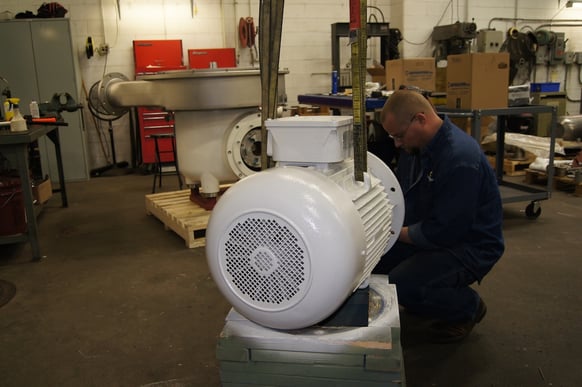If your centrifuge separator isn’t running at peak efficiency, you’re leaving dollars on the table. Simple as that. Depending on the product you’re running and the overall setup of your process, the variables that can cause your separator to under perform are countless.
Luckily for you and the material you run, there are some steps you can take. What I’ll be covering today are a few easy-to-spot signs that your separator is under performing — and what you can do about it.
Is Your Centrifuge Running at Optimal Levels?
The first thing to look at is flow rate. How many pounds per hour is your centrifuge rated at, and what is the actual number it runs? If running your equipment at the flow it’s rated produces low-quality product, something is wrong. That’s why it’s important to determine your flow rate.
If something isn’t programed, maintained, or calibrated properly, it’s all too easy to overfeed a centrifuge, which puts it under even greater stress. Beyond a low flow rate and poor quality end products, a centrifuge might be in need of valve adjustments or more thorough cleaning. A problem could also result from the temperature of the product you’re running being off. All of these issues can be assessed and addressed during a maintenance visit.
Centrifuge Service and Maintenance
Even a skilled operator doesn’t necessarily have the skills and credentials to properly assess and maintain a centrifuge separator. It’s important to have someone who is technically trained on separation equipment. They’ll have the resources and experience to identify what issues are preventing your separator from operating at optimal levels, and they will have access to the parts and tools to get your operation running at its best.
Centrifuge Training
While our skilled operators are servicing your centrifuge, we'll walk your team through how to spot potential issues, including regular wear and tear. By training your team to spot emerging issues, you can prevent unnecessary downtime and call an expert before your centrifuge creates serious problems.
Need a more in-depth review of your centrifuge? Request a consultation with one of our centrifuge service providers.
Frequency of Centrifuge Maintenance Needs
While your exact needs will differ based on whether or not you operate on a 24-hour schedule, it’s best to seek out centrifuge service once every six months. The six-month mark is when you want to have a top-end service. Some facilities call in an outside vendor to perform this service, and others have their employees trained on the proper procedure.
The one-year mark is when you want to have a full rebuild, which is when every inch of your centrifuge is looked over and anything that requires attention is attended to. When you provide centrifugal separators with regular maintenance checks, you can significantly improve your separation process and extend the life of your centrifuge equipment.


